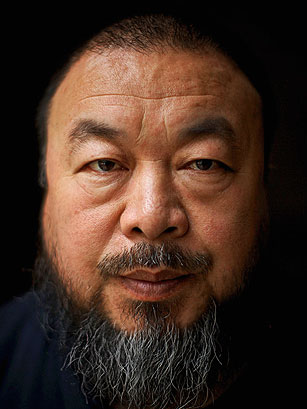
When people write on Chinese websites that they “love the future,” it should be a sentiment the government can get behind. After all, the authorities in Beijing have pressed their subjects to embrace the country’s bright economic prospects. But of late, “love the future” has taken on a new meaning. Online, people have begun to use the phrase, which is ai wei lai in Mandarin, as a code for the artist and political activist Ai Weiwei, whose name became too sensitive to post or search for on many Chinese websites after his detention by police on April 3.
Ai is the country’s best-known modern artist, with a current exhibition of 100 million porcelain sunflower seeds at London’s Tate Modern museum. His collection of bronze animal heads — replicas of those looted from Beijing’s Summer Palace by French and British troops in 1860 — is set to go on display outside New York City’s Central Park next month. A son of Ai Qing, a beloved revolutionary poet whose words Premier Wen Jiabao can quote from memory, Ai Weiwei is a burly online oversharer with 78,000 followers on Twitter. And he has emerged as one of the most prominent critics of China’s ruling Communist Party, drawing public focus to some of China’s most tragic events.
After the 2008 earthquake in Sichuan, Ai began to ask how many children were killed in collapsed schools, eventually organizing volunteers who canvassed mountain towns and tallied nearly 6,000 dead children. Chastened, the government finally released its own total of student deaths. Ai also produced a documentary film about a man who killed six Shanghai police officers, apparently in revenge for abuse the man had suffered while in custody. More recently, Ai began to look into the case of Qian Yunhui, a village chief in Zhejiang province who some people in China suspect was murdered at the behest of corrupt officials. Now, after years of raising sensitive questions and tweeting his nearly every move and thought, Ai has gone uncharacteristically quiet. He has been held incommunicado at an undisclosed location as Beijing police investigate him for suspected economic crimes. His silence raises a sensitive question: How much — if any — dissent is the Chinese government willing to tolerate?
A Subtle Rebellion
Ai was born in Beijing in 1957 during the first wave of Mao’s antirightist campaign, when hundreds of thousands of intellectuals were persecuted for their suspected opposition to radical economic reforms. His family was exiled to the western region of Xinjiang, where his father was forced to clean toilets. The family returned to Beijing in 1976, and a few years later Ai moved to New York City, where he began to paint, take photographs and produce subtly rebellious works, like a violin with a shovel handle. He went on a hunger strike after the 1989 Tiananmen crackdown but remained outside China until his father’s poor health drew him back in 1993. “This is your country,” his father told him as he was dying. “Don’t be polite.”
Ai hardly needed encouragement. One of his most famous works from that period was a photo series titled “Study of Perspective,” which showed him flipping off cultural and political monuments like the White House and Tiananmen Square. Another series showed him dropping a Han dynasty urn to symbolize the widespread destruction of history in China. He oversaw the construction of maps of China made from the wood of old temples, sculptures built from bicycles and massive chandeliers that mocked the ostentation of Communist officialdom. The unifying theme was “asking questions through objects,” says Philip Tinari, a Beijing-based expert in modern Chinese art. And then Ai decided to ask more and more of the questions himself.
Detained Artist Ai Weiwei Under Investigation for “Economic Crimes.”
Watch TIME’s video “TimeFrames: An Eye on China, Old and New.”